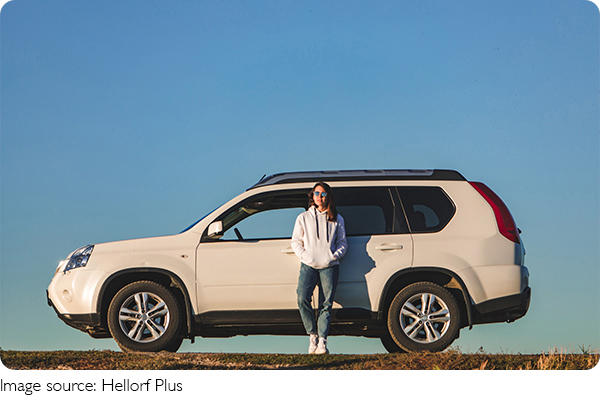
Navigate the Open Road

Self-driving travel offers a unique blend of freedom, spontaneity, and adventure, making it an increasingly popular way to explore new destinations.
Whether embarking on a short weekend getaway or an extended inter-provincial journey, the ability to control your itinerary and immerse yourself in the journey's scenic beauty is unmatched.
However, to ensure a smooth and safe road trip, it's essential to be well-prepared. Below is an expanded and comprehensive guide on the necessary items for self-driving travel, detailing their importance and functionality.
1. Vehicle Essentials
Driver's License and Vehicle Registration:
Before hitting the road, ensure that both your driver's license and vehicle registration are valid. Carry them with you at all times, as they are crucial not only for legal reasons but also in case you encounter checkpoints or require roadside assistance.
Related
 Discover how travel can enhance your mental and physical health, promote longevity and well-being.
Discover how travel can enhance your mental and physical health, promote longevity and well-being.
 Pedaling Towards Sustainable Living.
Pedaling Towards Sustainable Living.
 Small bathrooms can also be stylish!
Small bathrooms can also be stylish!
 Create a serene yet opulent home with light luxury style's blend of elegance, comfort, and high-quality design.
Create a serene yet opulent home with light luxury style's blend of elegance, comfort, and high-quality design.
 Transform your living room into what you need it to be!
Transform your living room into what you need it to be!
 Forest road self-driving tours: escape urban life, immerse in nature's beauty, enjoy driving, and explore culture.
Forest road self-driving tours: escape urban life, immerse in nature's beauty, enjoy driving, and explore culture.
Car Maintenance Tools:
Equip your vehicle with a set of basic maintenance tools. This should include a jack, wrenches, screwdrivers, and an emergency starting power supply. These tools can help you manage minor repairs and mechanical issues that may arise, ensuring you're not stranded in an inconvenient location.
2. Safety and First Aid Items
First Aid Kit:
A well-stocked first aid kit is vital. It should contain band-aids, disinfectants, bandages, antiseptic wipes, pain relievers, tweezers, and any other commonly used medications. This kit will be your first line of defense against minor injuries and illnesses, ensuring you can treat problems promptly and effectively.
Fire Extinguisher:
Although car fires are rare, carrying a small, portable fire extinguisher can be a lifesaver in an emergency. Ensure it's easily accessible and check its expiry date regularly to maintain readiness.
3. Navigation and Communication Equipment
GPS Navigation Device or Mobile Navigation App:
Modern navigation tools are crucial for a smooth journey. A GPS device or a reliable mobile navigation app provides real-time route planning, traffic updates, and alternative routes to avoid congestion. These tools are particularly useful in unfamiliar areas, helping you stay on course and save time.
Mobile Phone and Charger:
Staying connected is vital, especially during emergencies. Ensure your mobile phone is always charged, and bring along a car charger or a portable power bank. This guarantees that you can call for help, use navigation apps, or check important information at any time.

4. Daily Necessities
Drinking Water and Food:
Whether your trip is short or long, carrying sufficient drinking water and non-perishable food items is essential. This is particularly important when traveling through remote areas where supply points might be scarce. Consider bringing snacks like nuts, and dried fruits, along with bottled water.
Tents and Sleeping Bags:
If your trip includes camping, packing a tent and sleeping bag is crucial. Choose a tent that suits the weather conditions and a sleeping bag that offers appropriate insulation for the season. These items will ensure you have a comfortable and safe place to rest each night.
5. Personal Belongings
Clothing:
Pack suitable clothing based on your destination's climate and weather forecast. Even in summer, bring a few warm layers to prepare for unexpected temperature drops. Waterproof and windproof clothing can also be beneficial in unpredictable weather conditions.
Toiletries:
Maintain personal hygiene by packing essential toiletries such as a toothbrush, toothpaste, shampoo, soap, and a towel. Having these items on hand will ensure you stay clean and comfortable throughout your journey.
Sunscreen and Insect Repellent:
Protect your skin from sunburn and insect bites by bringing along sunscreen and insect repellent. These are especially important if you plan to spend a lot of time outdoors, as they will help you avoid discomfort and potential health issues.
Conclusion
Self-driving travel is an exhilarating way to explore new places and experience the open road. However, the key to a successful and enjoyable trip lies in meticulous preparation and planning.
By ensuring your vehicle is well-equipped, prioritizing safety and first aid, utilizing modern navigation and communication tools, and packing essential daily and personal items, you can embark on your adventure with confidence.